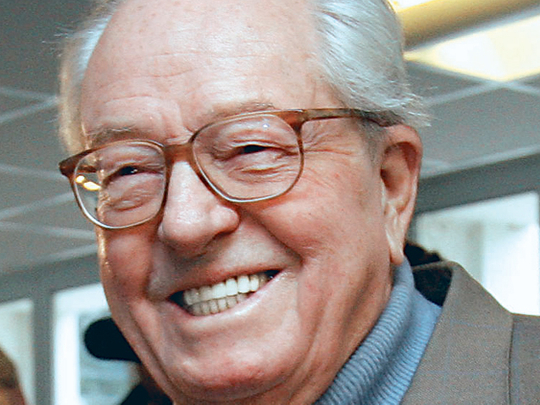
During the French presidential campaign of 2007, I trailed Jean-Marie Le Pen to a dilapidated sports hall in Marseille to watch him deliver a speech staking his claim to run France. The setting peeling white walls daubed with racist graffiti and creaky spectator platforms swaying under the weight of a few shaven-headed young men and blue-rinse grannies could not have been more appropriate. The lumbering figure emitting spittle and sweat up on the podium in front of me looked every inch the prize boxer who had long since stopped boxing, let alone winning prizes.
Afterwards, Le Pen invited me into his personal changing area where Janny, his over-made-up wife, wiped his forehead and tutted worriedly as he collapsed into a leather armchair. "Where do you come from?" he asked, offering me his quivering, meaty hand, before inquiring more deeply into my racial origin in a manner that was as outdated as it was offensive. At almost 80, the Foreign Legion-trained brawler who had shocked the civilised world by being a runner-up in the 2002 presidential bout was as much of a spent force as his party, the Front National.
So why, three years on, have they done so well in the first round of regional elections? In the kind of comeback performance normally associated with George Foreman, Le Pen earned a personal vote of 20 per cent in his Provence-Alpes-Côte d'Azur heartland, while nationally his party won 12 per cent of the poll. If the results are repeated in the second round today, then the Front National can once again claim to be the party of choice of the unthinking Gallic bigot.
Tellingly, Eric Besson, France's notoriously rightwing immigration minister, said he was shocked. Last month he had described the Front National as a "bogeyman that no longer exists", suggesting that their offensive mix of populist racism and xenophobia should not be channelled through a staid gang of provincial nationalists.
What Besson meant to say, of course, was that such feelings should be channelled through his own governing party, the Union for a Popular Movement. There is little difference between the Front National's principal election poster an image of France covered by an Algerian flag, a burqa-clad woman, and minarets shaped as missiles and the kind of racist ideas that Nicolas Sarkozy's government have been propagating ever since they came to power in 2007.
It was Sarkozy, remember, who in 2005 told parliament that those responsible for riots in the major cities were "foreigners not all of whom are here illegally". This wasn't long after he had casually referred to rebellious kids of immigrant origins from the burbs as racaille, or "scum".
Since his general election win, Sarkozy has continued to stigmatise France's five million-plus Muslim community, galvanising all this prejudice into an ill-conceived national identity debate that is proving just as divisive as any of Le Pen's ramblings. Official websites and public debating chambers are awash with every kind of insult and insinuation offering, in the words of Socialist opposition leader Martine Aubry, an "open door" for the Front National. Well, Le Pen has now marched through it, without having to throw so much as a single punch.
Nabila Ramdani is a Paris-born newspaper journalist and a TV and radio commentator.










